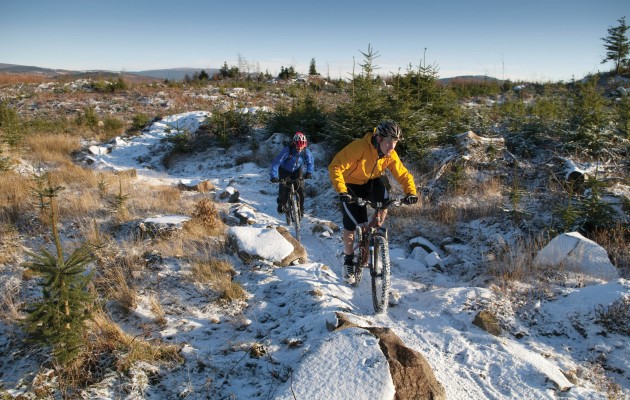Riding in the snow will make you fitter, faster and more skilful… and wetter
It’s a universal truth that snow is lovely. For a while. In the right place.
That first snowfall adds magic and beauty to a familiar trail and, although it’s more slippery and hides deceptive obstacles, falling over onto the white stuff doesn’t seem to hurt as much. Of course, it gets less fun when your car gets stuck in the car park and you have to wait for a gloating 4×4 driver to rescue you.
But does snow help your riding? The received wisdom from exercise scientists has been that it’s easier to go harder and work up a sweat when the trails are warm and clear than in a winter wonderland when top speeds are inevitably lower.
They’ve had this belief because experience shows that muscles don’t hurt as much when cycling in the snow, even when you put in as much effort as humanly possible. So, the logic has been that the conditions mean your body just doesn’t, or won’t, work so hard. According to this school of thought, snow riding is slower and not nearly as taxing as speeding along the same trail when it’s clear.
But 11 maverick mountain bikers have been chugging fat bikes along the same trails in fine weather and foul to set the record straight.

Riding Salsa Mukluks shod with Surly Nate tyres at 8psi, the human lab rats first rode their local four-mile XC trails in typical autumn weather. Five months later, in the depths of a Michigan winter, they deflated the Nates to 4psi to get more traction, and rode the same trails again, as fast as they could.
The results showed a fat bike will give your body exactly the same intensity of exercise riding on snow as riding on dirt. It may feel like riding in snow is not such hard work because the lactic acid levels are lower — that’s the stuff that makes your leg muscles scream with pain. And why is there less lactate? Two reasons:
First, the snow makes you slower, so there’s more time for the pain-inducing acid to disperse. Secondly, the cold keeps it at bay. Our advice then is to get out and play in the snow — just remember to wear your mittens.




